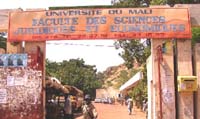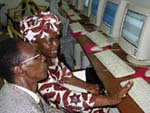Building Digital Bridges: Information Technology Training at the University of Bamako, Mali
March, 2003, Bamako
How can a University with 80% of its teachers unfamiliar with the internet successfully integrate and manage the largest IT network in Mali? In a word–training.

Entryway to the Law and Economics Department, University of Bamako.
Just two years ago faculty members and students at the University of Bamako had little knowledge or access to information, communications technologies (ICTs). An earlier University of Bamako project assessed IT needs and installed 11 servers and 240 computers with internet access—a network of unprecedented size in Mali. The USAID/Mali and University of Bamako dot-EDU project’s primary objective is to ensure that students, faculty members and university administrators not only have access to these computers but are able to use them to improve the quality of teaching and learning. Two types of training are underway: training of LAN/WAN managers; and faculty training in Microsoft Office and basic internet use.
- Faculty member
Sine Traore, EDC LAN/WAN (Local Area Network and Wide Area Network) trainer for the dot-EDU project explained some of the initial overall challenges: “Before this project, nearly 80% of University teaching and administrative personnel were unaware of the benefits that Internet use could bring to their work. In fact, many people had heard of the Internet but in reality did not know what it was for…many also did not understand what computers were for.” Mr. Traore’s goal is to ensure that LAN/WAN administrators in particular are able to manage and problem-solve for all aspects of the network. LAN/WAN training covers technical and administrative networks, technical training in Microsoft server software as well as cables and TCP/IP information.
In addition to technical training, administrators have learned about planning and Help Desk management. Workgroups facilitate continued learning among network administrators. According to Cheick Sagara, a newly trained administrator, “In addition to presentations and discussions, the workgroups enable administrators to have a team that is solid, united and available to the University of Bamako.”

Faculty members receive training at newly installed workstations.
Teachers are also becoming computer savvy. Howard University conducted training in Microsoft Office and related software programs with 150 faculty members. The 100 hours of computer training ran the gamut--everything from web site navigation to the use of SPSS software, a quantitative research tool. A particular emphasis was placed on subjects directly relevant to academic disciplines taught by the teachers like science, math, law and economics. In addition, the MATRIX department of Michigan State University is building the capacities of over 70 University of Bamako faculty to use interactive on-line technologies for communications and research. Participants learn the basics of Windows, email, Internet navigation and web page design. These teachers and administrators have already begun building bridges across the Digital Divide. “Personally, I have been ‘bitten’ by the internet ‘bug’,” says Ousseni Diawara, faculty member at the University of Bamako. He continues, “I sincerely appreciate the quality, content and pedagogy of the training methods used.”
The training modules have encountered some challenges that reflect the growing pains of the revamped ICT department. Slow and sporadic connectivity to the server, limited computer access outside of training class and an insufficient number of LAN/WAN administrators warranted creative problem solving in order for participants to be able to download necessary software, access the internet and practice principles learned in class. These challenges drew attention to the fact that an ICT network is not just about computers—it requires human and financial resources as well as cooperation across departments. The University administration is now working diligently to resolve these issues, and it appears the enthusiasm of faculty and administrators is unaffected. ICT training at the University has enabled them to not only learn, but to promote learning through the use of information technology. Indeed, the University of Bamako is on the road to ICT autonomy.
For more information about this project, please contact:
- EDC Project Director, Sonia Arias, sarias@edc.org
